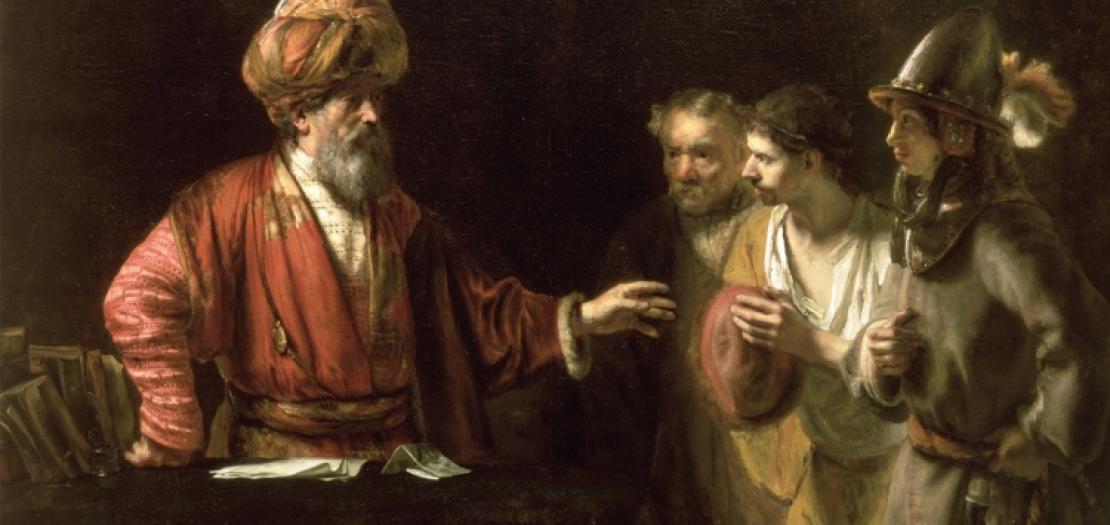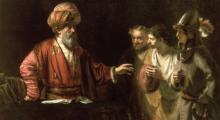Issued by the Catholic Center for Studies and Media - Jordan. Editor-in-chief Fr. Rif'at Bader - موقع أبونا abouna.org

Following is the text of the meditation by His Beatitude Cardinal Pierbattiasta Pizzaballa, Latin Patriarch of Jerusalem, on the 19th Sunday of Ordinary time, dated August 10, 2025:
Today’s passage from the Gospel (Luke 12:32-48) is closely related to last Sunday, when the Lord Jesus told the parable of the rich fool (Luke 12:13-21): Today the meaning is clarified, the content deepened and, in a sense, we are given the key to understanding something that had been left suspended.
On previous Sundays, we were left with some important questions: What is the good part that Mary had chosen and that will not be taken from her? (Luke 10:42) And what are the goods that do not perish, what does it mean to be enriched before God? (Luke 12:21)
Jesus talks to his own about this topic because it is an important one: it is about eternity, so it is also about our hearts, it tells us where we stand in life, what is really important to us, what we have attached the meaning of our existence to.
The passage begins with a fundamental word, v. 32: “Do not be afraid any longer, little flock, for your Father is pleased to give you the kingdom.”
Perhaps the key that gives us access to this sentence lies in this “little flock” of which Jesus speaks and which leads us back to all those passages in the Old Testament in which God makes it clear that He has chosen, loved and protected His people, not because they are greater than all other peoples, but precisely because they are the smallest, the most insignificant (“It was not because you are more numerous than all the peoples that the LORD set his heart on you and chose you…” (Cf. Deut. 7:7-8)
This is how God acts. He loves and chooses people not because they have merits or make special demands, but because it pleases Him to do so. For God loves freely. The Father has given us His Kingdom, he has given it to our smallness.
What is essential for living has been given to us. The Kingdom of God is not a wealth that must be accumulated; it is not a treasure that must be conquered. It has nothing to do with all the goods that the rich man in the parable wanted to accumulate in his storehouses. On the contrary, it has more to do with lack than with possession.
Immediately afterwards, in fact, Jesus uses images that are more reminiscent of a lack than a presence: “selling what you own”, “giving the proceeds as alms”, “waiting for the Lord who has gone to the wedding...”
Then, the Kingdom comes through the experience of an emptiness, a lack, is almost like a wound.
For the emptiness, the lack and the wound excavate in the human heart the expectation and the desire that are the most precious goods for life. They open us up to something that goes beyond us, they open us up to encounters, to prayer, to friendship. The rich man in the parable was trapped in his own wealth and could not see beyond himself and his wealth. Waiting and desire, on the other hand, open our hearts to life, to solidarity, to spreading the good, to service.
This is why Jesus uses an adjective in these verses that always refers to the Kingdom of God and always has to do with lack: blessed. Blessed are those who, when the Lord returns, will be found in their place serving their brothers and sisters (“Blessed is that servant whom his master on arrival finds doing so.” ( Luke 12:43)
For Jesus, “blessed” is never the one who possesses something, but always the one who hopes, who remains open to the gift, in trust. A gift that, as we have already said, has the face of relationships and friendship to be lived in service. When this happens, is realized the Kingdom of God, which is like a seed that grows where it finds a place. And the fruit of this path of growth is hidden in a word that we find twice in today’s Gospel.
At the beginning is the Father, who was pleased to give us the Kingdom (“…for your Father is pleased to give you the kingdom”. ( Luke 12:32)
At the end is the servant who, while waiting for his master to return, gives his companions the right ration of food (“Who, then, is the faithful and prudent steward whom the master will put in charge of his servants to distribute the food allowance at the proper time?” (Luke 12:42)
While he waits, the servant learns the art of giving, and of giving with joy, just as the Father gives us his Kingdom and delights in what he does.
For the one who learns this art, life is turned upside down and he becomes rich; (Luke 12:44) not in riches that end, but in all God’s possessions, in his own life: “Truly, I say to you, he will put him in charge of all his property”.
+Pierbattista







